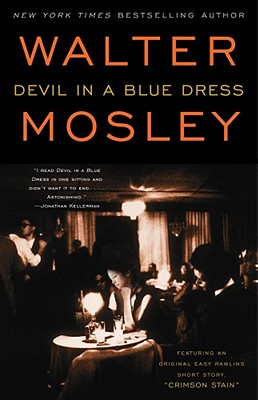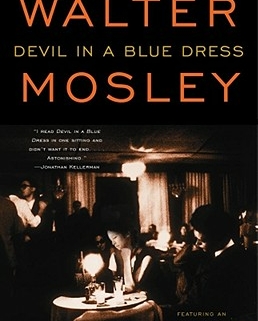Writers Read: Devil in a Blue Dress by Walter Mosley
 Walter Mosley’s Devil in a Blue Dress is a quintessential hard-boiled mystery novel. Mosley’s protagonist, Easy Rawlins, is on par with two of the genre’s most notable characters, Dashiell Hammett’s Sam Spade and Ross MacDonald’s Lew Archer. Set in 1948 Los Angeles, the sharply written first person narrative pays homage to its traditional genre conceits. There is a beautiful woman, seedy bars, crooked cops, bad guys, corrupt politicians and of course, murders. From the opening sentence, the novel is fast moving and entertaining as Easy goes about finding a missing woman. While the novel is an example of expert craftsmanship as it relates to plot, character development, and narrative voice, it excels at social commentary. Infused in the entertainment are bitter lessons on racial inequities and social injustice experienced by people of color, and in particular, the black male.
Walter Mosley’s Devil in a Blue Dress is a quintessential hard-boiled mystery novel. Mosley’s protagonist, Easy Rawlins, is on par with two of the genre’s most notable characters, Dashiell Hammett’s Sam Spade and Ross MacDonald’s Lew Archer. Set in 1948 Los Angeles, the sharply written first person narrative pays homage to its traditional genre conceits. There is a beautiful woman, seedy bars, crooked cops, bad guys, corrupt politicians and of course, murders. From the opening sentence, the novel is fast moving and entertaining as Easy goes about finding a missing woman. While the novel is an example of expert craftsmanship as it relates to plot, character development, and narrative voice, it excels at social commentary. Infused in the entertainment are bitter lessons on racial inequities and social injustice experienced by people of color, and in particular, the black male.
Easy Rawlins is black. He is neither a police officer nor private investigator. He is an out-of-work everyman who simply needs to pay his mortgage. Mosley’s choice to create his main character in this way lends strength to the novel. Easy has migrated to Los Angles from Houston for a better life, and for all intents and purposes, has succeeded. He is a homeowner, owns a nice car, and has recently earned his high-school diploma in night school. Even still, his world is on the brink of collapse. He has recently lost his job for standing his ground with a white man. It is in this container of social injustice that the story takes place.
Devil in a Blue Dress begins its social commentary in the first sentence: “I was surprised to see a white man walk into Joppy’s bar,” Mosley writes. He goes on to use the word white five times in the opening paragraph while laying the groundwork for what appears to be the novel’s thematic conflict: how does a black man self-actualize in a society where powerful, white male forces are his constant nemesis? It is the age-old Negro question that appears in the writings of social reformers Frederick Douglass, Marcus Garvey, Malcolm X, and Martin Luther King Jr.
Mosley does a masterful job introducing the antagonistic forces of white male privilege in the character of Mr. Dewitt Albright. Albright (a play on words) is described as a white man large enough to block the doorframe. He wears a white linen suit, white shoes, white silk socks, and even drives a white Cadillac. Albright’s strawberry blond hair and pale eyes cause Easy to feel “a thrill of fear.” Albright feigns respect to gain Easy’s confidence. However, when asked how he might respond if Easy broke into his house he replied, “I’d tear your nigger head out its root.”
Mosley writes, “A job in a factory is an awful lot like working on a plantation in the South.” This powerful sentence sets up the novel’s social commentary on another bastion of white male privilege, the workplace. The dominant caricatures of black men during slavery—Coon, Picaninny, and Tom—portrayed them as lazy, childlike, ignorant, and groveling. Easy’s supervisor, Benny Giacomo, whom he describes as, “darker than many mulattos I’d known,” holds the negative stereotypes resulting from the propaganda that has become folklore. He sees Easy as lazy, childlike, and in need of a lesson. Easy, on the other hand, when presented with an opportunity to get his job back, is not willing to grovel. He says, “I concentrated on keeping my head erect, I wasn’t going to bow down to him.”

Walter Mosley
The novel also offers commentary on the violent policing of black men. Throughout the story, the police loom as a capricious, evil, and predatory force. After Easy is punched in the diaphragm and tossed in the backseat of a cruiser without explanation, we learn that it is a regular occurrence. “I had played the game of cops and nigger before,” Easy says while in custody. “It’s hard acting innocent when you know you are, but the cops know that you aren’t.” The police station scene sheds light on law enforcement propensity to incarcerate innocent black men. It also speaks to the physical violence the black male often endures: “Before I could turn I felt the hard knot of his fist explode against my head.”
In his quest to find the missing woman, Easy gains access to the world of Todd Carter, one of Los Angeles’s most powerful men. The scene is crafted in a way that offers the reader hope. After Easy experiences violence and threats of violence at the hands of the other white male characters in the novel, Todd Carter appears to be civil toward him. Mosley draws Carter as vulnerable, honest, and caring. Sitting in Carter’s office drinking the finest brandy he has ever tasted, Easy says it feels like they are best friends, even closer. Noticing that Carter doesn’t have the fear or contempt that most white people show when dealing with him, Easy feels a sense of relief, as if he will finally be treated with the dignity he deserves. He comments in the next sentence, however, “Todd Crater was so rich he didn’t even consider me in human terms. I could have been a prize dog. It was the worst kind of racism.”
Walter Mosey said, “I write about believable black male heroes in a world where there aren’t many.” Easy Rawlins is heroic and believable, indeed. In a society where the dominant white male seeks to dehumanize at every turn, he maintains his dignity. Most importantly, however, he keeps his cool offering a counter to the stereotype of the angry, reckless black male. Describing the voice that speaks to him in the worst of times, Easy says, “The voice has no lust. He never told me to rape or steal. He just tells me how it is if I want to survive. Survive like a man.”
Mosley, Walter. Devil in a Blue Dress. Washington Square P, 2002.


 Andre Hardy is an MFA candidate at Antioch University Los Angeles. He is a graduate of St. Mary’s College of California and was the fourth pick of the Philadelphia Eagles in the 1984 NFL draft. He writes hard-boiled, gumshoe stories with an urban twist. He is the executive director of
Andre Hardy is an MFA candidate at Antioch University Los Angeles. He is a graduate of St. Mary’s College of California and was the fourth pick of the Philadelphia Eagles in the 1984 NFL draft. He writes hard-boiled, gumshoe stories with an urban twist. He is the executive director of 


